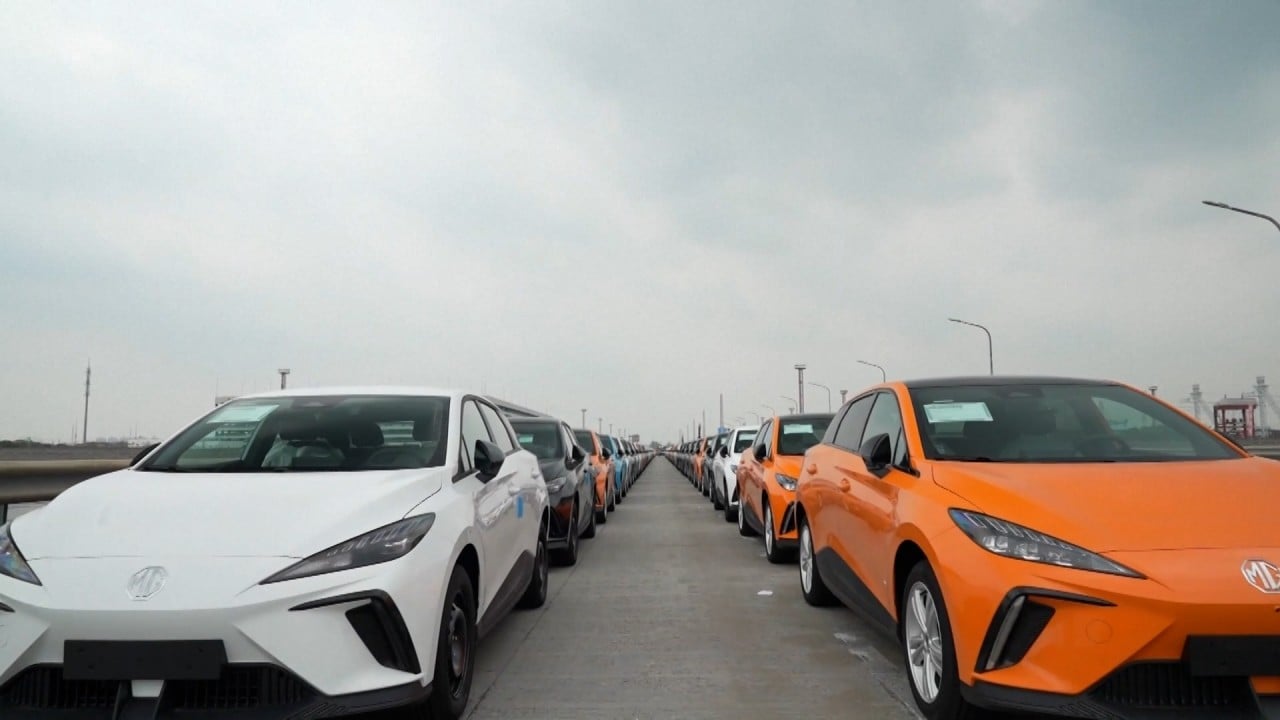
EU to investigate ‘floods’ of cheap Chinese electric vehicles, sparking fears of trade war
- Brussels will look into China’s alleged subsidising of EVs, says European Commission president Ursula von der Leyen during annual policy speech
- It comes amid fears in Europe that Beijing’s industrial policy is undermining efforts to compete in innovative industries
It comes amid fears in Europe that Chinese industrial policy is undermining its efforts to compete in innovative sectors.
“Global markets are now flooded with cheaper Chinese electric cars and their prices kept artificially low by huge state subsidies. This is distorting our market,” von der Leyen said.
It’s ‘complicated’: EU de-risking push casts shadow over Chinese premier’s trip
“We have not forgotten how China’s unfair trade practices affected our solar industry. Many young businesses were pushed out by heavily subsidised Chinese competitors, pioneering companies had to file for bankruptcy,” von der Leyen said.
“And as we do not accept this distortion from the inside in our market, we do not accept this from the outside. So I can announce today that the commission is launching an anti-subsidy investigation into electric vehicles coming from China.”
It is understood that the commission has already done significant investigative work and found evidence of state subsidies across the electric vehicle supply chain, including in the battery sector and the production of the cars themselves.
Trade officials will sound out their Chinese counterparts and attempt to gain their input to the investigation. It is understood that no official consultation has yet taken place with Beijing, although media reports suggested von der Leyen raised the issue with Chinese Premier Li Qiang in India last weekend.
China has leapfrogged Japan as the world’s largest car exporter, and European automotive companies are increasingly concerned about their ability to compete with what they see as heavily subsidised Chinese competitors.
The Post’s calculations based on Chinese customs data showed that in the first seven months of 2023, Chinese electric vehicle shipments to the EU soared to US$7.9 billion, an increase of 113 per cent from a year earlier, of 379 per cent from 2021, 3,205 per cent from 2020 and 78,900 per cent from 2019.
According to an EU official, Chinese brands accounted for 8 per cent of the EU’s electric vehicle market share in 2022, while there was a 20 per cent difference in market prices between Chinese brands and European competitors.
The investigation could eventually result in additional duties imposed on Chinese-made electric vehicles entering the European market, which could in turn provoke a response from Beijing at a time when trade tensions are already running high.
The EU will impose import duties, should they be required, within 13 months. The formal investigation will focus on the year preceding the initiation. Provisional anti-subsidy duties may be imposed nine months after the investigation launches.
The duties would not be limited to Chinese brands: any company, including European carmakers, that receives subsidies from the Chinese state and then exports to the EU could face tariffs on their shipments.
“Europe is open to competition but not for a race to the bottom. We must defend ourselves against unfair practices. But equally it is vital to keep open lines of communication and dialogue with China because they are also topics where we can and have to cooperate,” von der Leyen said at the European Parliament in Strasbourg.
The move on electric vehicles can be seen as a sweetener for French industry, which has been pushing Brussels to be more aggressive in its trade policy, particularly on electric vehicles. In recent years, the bloc has developed a suite of trade defence instruments designed to counter non-market economies like China’s, but it has often been reluctant to use them.
The cumulative impact of the pandemic and Russia’s invasion of Ukraine, however, has ushered a more combative economic mood in Brussels and beyond. Industrial policy is back in vogue, and measures that would previously have been dismissed as protectionist among free-trade evangelists are now seen as vital tools in creating a more resilient single market.
Biden plan to curb China investments focuses EU minds as deadline looms
In Paris, such policies have rarely lost their lustre. “Finally Brussels is catching up with us!” one senior French diplomat said. “Industrial policy is no longer a dirty word.”
Thierry Breton, the EU’s internal market commissioner and seen to be close to French industry, previously said he was “very much in favour of opening a dumping investigation into electric cars as soon as possible”.
On Tuesday, French Economy Minister Bruno Le Maire said he would attempt to coax a reluctant Germany on board with France’s vision to build up EU industrial policy to protect European businesses.
“We’re better off working hand in hand [to develop] a much more proactive [and] innovative industrial strategy” that would “better protect our industrial interests relative to China and the US”, Le Maire told French media LCI.
The German Association of the Automotive Industry (VDA) urged the EU to consider “possible reactions from China” during its investigation.
“It is clear that an anti-subsidy investigation alone does not contribute to solving the existing challenges regarding the competitiveness of the European location. The policy in Brussels and Berlin must create the framework conditions for the transformation to succeed,” Hannes Schumann, a VDA spokesman, said.
It is not the first time von der Leyen has used the state of the union address to launch policies aimed at China.
In 2021, she surprised even her own team by announcing that the EU would ban products made using forced labour from the single market. Subsequent legislation did not name China, but officials privately admit it was inspired by allegations of mistreatment of Uygur workers in China’s far western region of Xinjiang.


